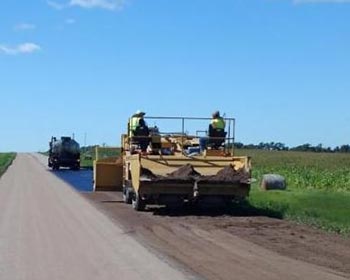LaMoure County Revives the Sand Seal
Posted: Jun 24, 2020
 Gerard Feist, NDLTAP asphalt expert, joined the LaMoure County crew last fall to aid in the revival of the sand seal. Gerard was impressed by the county crew's efforts and their ability to adapt from a normal chip seal to a sand seal. "Great crew and quality end product. Kudos to LaMoure County," he said.
Gerard Feist, NDLTAP asphalt expert, joined the LaMoure County crew last fall to aid in the revival of the sand seal. Gerard was impressed by the county crew's efforts and their ability to adapt from a normal chip seal to a sand seal. "Great crew and quality end product. Kudos to LaMoure County," he said.
Josh Loegering, LaMoure County Engineer, wanted to try a sand seal in an effort to find a new pavement preservation tool for some of his low-volume paved roads, an effort that better utilizes aggregate sources. Here's his project synopsis: "We did a total of 9.5 miles of sand seal on County Road 35 between U.S. Highway 281 and the City of Jud. We used CRS2P (emulsified asphalt) at a rate of 0.17 gallons/square yard. To get a better spray pattern we turned off every other nozzle on the spray bar. The sand was applied at a rate of 25 lbs/square yard with a chip spreader. The sand was very wet, so to make sure it came out of the trucks into the chip spreader without bridging, we removed the tail gates".
"Rolling was done exactly the same way we do our chip seals (two pneumatic rollers). After a few weeks we swept the entire project twice to remove the excess sand. A fog seal using CSS1H (slow-setting emulsified asphalt) diluted to 50% was applied on the entire project at a rate of 0.105 gallons/square yard. Pavement markings were installed after about a week."
"Prior to the sand seal, we crack leveled six miles of the project. Overall, the ride was greatly improved and I think it turned out very well for our first sand seal in over 30 years."
"Some years back, sand seals got a bad rap," Feist noted. "Oil flushing led to loss of skid resistance. Today, we have different oils to choose from and options to allow sand seals to perform well. Our hat is off to LaMoure County for getting us back into sand seals. Their use means that we use less oil and a less valuable pit material to preserve our roadways. Sand seals are a great tool in any low-volume road program."